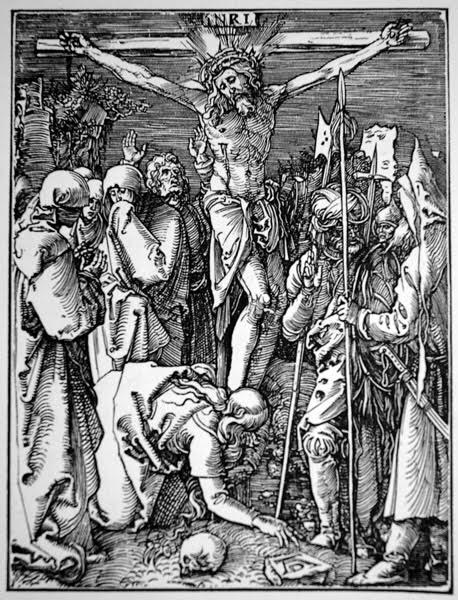by Rev. Christopher Maronde
The sermon under consideration can be found in The Complete Sermons of Martin Luther, Volume 1.2, Baker Books, pgs. 183-192. References are to paragraph numbers.

Good Friday was always one of my favorite days in the Church Year calendar. The service was unique, shrouded in increasing darkness, and the drama of the last hours of Jesus’ earthly life played itself out in our hearing. In college, I joined so many others from my Lutheran university, packing the local theater and shedding tears as we experienced Mel Gibson’s The Passion of the Christ. Though filled with Roman Catholic theology, this movie had wide appeal among Protestant Christians, who wanted to be deeply moved by seeing Christ’s death.
Martin Luther never watched The Passion of the Christ, but his age had its own graphic, emotion-producing portrayals of Christ’s death. Crucifixes, statues, and paintings, extremely realistic, declared to the common man the anguish of their Lord’s death. In his day, passion-piety was at its peak, as the Church encouraged the laity to deeply consider Christ’s suffering as a meritorious act. Luther paraphrases a statement from Albertus, who said that “to think once superficially on the sufferings of Christ is better than to fast a whole year or to pray the Psalter every day, etc.” (2)
In the midst of a world whose consideration of Christ’s death is perhaps not so different than our own, Luther published a Good Friday sermon: “A Sermon on how to Contemplate Christ’s Holy Sufferings.” This sermon appeared in pamphlet form in 1519, a year in which it had fully fifteen editions. Five more editions would appear in the next five years, making this one of the most frequently issued writings of Luther during his life. In this sermon, Luther determined to set the record straight concerning man’s contemplation of Christ’s sufferings. He lists sixteen different ways that Christ’s sufferings could or should be contemplated.
He begins with three ways that people wrongly consider Christ’s death. Each have in common that they are each directed to simply affect the emotions, to stir feelings of sadness, pity, or even anger at Christ’s adversaries.
“Such an exercise may truly be called a meditation not on the sufferings of Christ, but on the wickedness of Judas and the Jews.” (1)
“Others have pointed out the different benefits and fruits springing from a consideration of Christ’s Passion… They seek therein their own selfish interests.” (2)
“[They] sympathize with Christ as to weep and lament for Him because He was so innocent, like the women who followed Christ from Jerusalem.” (3)
What is wrong with these contemplations is that each of them, in their own way, avoid suffering. “In this way the suffering of Christ is to work in them an absence of suffering, which is contrary to its nature and character.” (2) Whether we are looking down on Christ’s enemies, using consideration of His death for our own merit, or simply weeping for His innocent death, we have avoided any suffering on our own part.
How should Christ’s suffering and death then be rightly considered? In a move that may be quite surprising to many, Luther turns first to the Law, listing eight different ways that the sufferings of Christ are to remind us of our sins and put the sinful Adam to death. What is the goal of a contemplation of Christ’s sufferings?
“The benefit of Christ’s sufferings depends almost entirely upon man coming to a true knowledge of himself, and becoming terror-stricken and slain before himself. And where man does not come to this point, the sufferings of Christ have become of no true benefit to him.” (8)
A contemplation of Christ’s affliction is to afflict our sinful soul, killing the old Adam. The contemplation of Christ’s sufferings is to bring us suffering, the suffering wrought by God’s Law. We are not to weep for Him, but for ourselves.
“You are the one who thus martyred Christ. For your sins most surely did it.” (5)

“Where one thorn pierces Christ, there more than a thousand thorns should pierce thee, yea, eternally should they thus and even more painfully pierce thee.” (6)
“Then Christ’s suffering accomplishes its true, natural and noble work, it slays the old Adam, banishes all lust, pleasure and security.” (10)
The sufferings of Christ are the most potent Law imaginable, showing us exactly what God thinks of our sins and the judgment that we have justly deserved. But we do not remain in despair.
“If we deal with our sins in our conscience and let them continue within us and be cherished in our hearts, they become much too strong for us to manage and they will live forever. But when we see that they are laid on Christ and He has triumphed over them by His resurrection and we fearlessly believe it, then they are dead and have become as nothing.” (13)
The great truth of Christ’s sufferings is that they were for us and our salvation. The sufferings of Christ are the most beautiful Gospel imaginable, showing us God’s love and His salvation.
“Cast your sins from yourself upon Christ, believe with a festive spirit that your sins are His wounds and sufferings, that He carries them and makes satisfaction for them.” (13)
“Press through all difficulties and behold His friendly heart, how full of love it is toward you, which love constrained Him to bear the heavy load of your conscience and your sin.” (15)
Finally, the sufferings of Christ then for the regenerate believer encourage him to stand firm in the faith in every affliction unto death, bearing the suffering imposed by this world and rejecting the chains of sin.
“When your heart is thus established in Christ, and you are an enemy of sin, out of love and not out of fear of punishment, Christ’s sufferings should also be an example for your whole life.” (16)
The contemplation of Christ’s sufferings thus encompasses the entire life of a Christian, Law and Gospel, justification and sanctification. The Christian rightly considers Christ’s Passion, His innocent suffering and death, when such contemplation does the work that God’s Word always does: God’s alien work of putting the sinful man to death through the Law, and God’s proper work of forgiving and raising up a new man in Christ. In Christ’s sufferings we know God rightly, “We apprehend Him not by His power and wisdom, which terrify us, but by His goodness and love; there our faith and confidence can then stand unmovable and man is truly thus born anew in God.” (15)
The Rev. Christopher Maronde is associate pastor of Good Shepherd Lutheran Church, Lincoln, Nebraska.